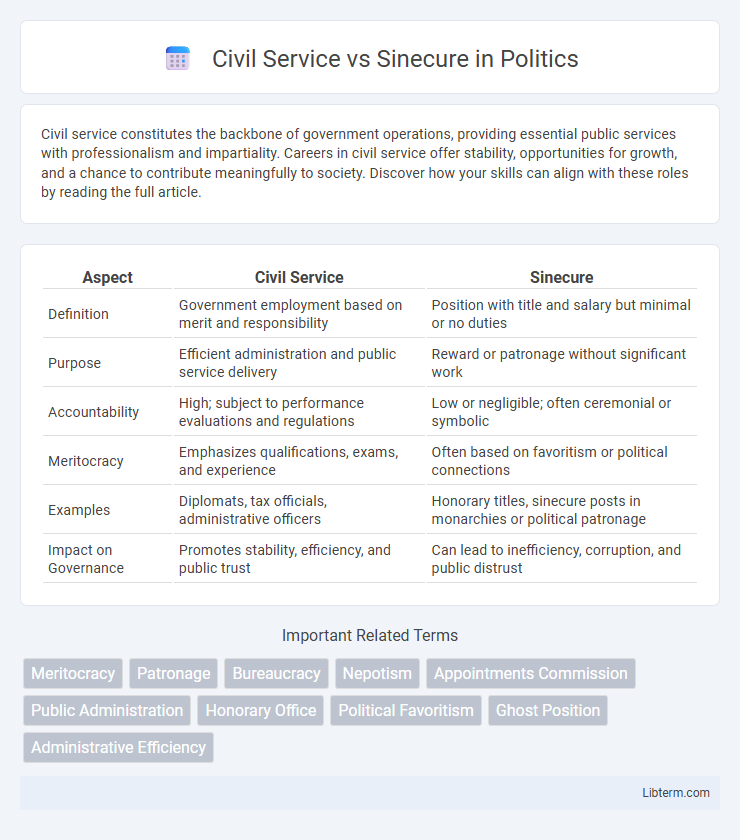Civil service constitutes the backbone of government operations, providing essential public services with professionalism and impartiality. Careers in civil service offer stability, opportunities for growth, and a chance to contribute meaningfully to society. Discover how your skills can align with these roles by reading the full article.
Table of Comparison
| Aspect | Civil Service | Sinecure |
|---|---|---|
| Definition | Government employment based on merit and responsibility | Position with title and salary but minimal or no duties |
| Purpose | Efficient administration and public service delivery | Reward or patronage without significant work |
| Accountability | High; subject to performance evaluations and regulations | Low or negligible; often ceremonial or symbolic |
| Meritocracy | Emphasizes qualifications, exams, and experience | Often based on favoritism or political connections |
| Examples | Diplomats, tax officials, administrative officers | Honorary titles, sinecure posts in monarchies or political patronage |
| Impact on Governance | Promotes stability, efficiency, and public trust | Can lead to inefficiency, corruption, and public distrust |
Understanding Civil Service: Definition and Purpose
Civil service refers to a professional body of government employees engaged in the administration of public policies and delivery of services, selected based on merit through competitive examinations. Its primary purpose is to ensure efficient, impartial, and continuous governance by maintaining a stable workforce that operates independently of political influence. Unlike sinecures, which are positions often granted as honorary or political favors with little actual responsibility, civil service roles demand accountability and active public service.
What Is a Sinecure? Key Characteristics
A sinecure is a position or office that requires little or no actual work but provides financial benefit or status. Key characteristics include the absence of substantial duties, the receipt of a salary or other compensation, and often a symbolic or honorary role within an organization or government. Unlike typical civil service roles that demand active responsibility and performance, sinecures primarily serve as privileged appointments with minimal obligations.
Historical Origins: Civil Service and Sinecure Compared
Civil service originated during ancient civilizations such as China's Han Dynasty, where merit-based bureaucratic systems were developed to efficiently manage state functions. Sinecures date back to medieval Europe, often granted by monarchs as honorary positions with salaries but little responsibility, reflecting the patronage and feudal hierarchies of the time. While civil service emphasizes competence and public administration, sinecures represent privilege and status within historical governance structures.
Roles and Responsibilities: Civil Servants vs Sinecure Holders
Civil servants are entrusted with specific administrative duties and public service responsibilities that ensure government operations run efficiently and transparently. Sinecure holders, by contrast, often occupy positions with little to no actual work or oversight, benefiting primarily from the title or salary without corresponding obligations. The clear distinction lies in the active fulfillment of roles by civil servants versus the nominal or symbolic nature of sinecure positions.
Recruitment and Selection Processes
Civil service recruitment and selection processes emphasize merit-based exams, transparent evaluations, and strict eligibility criteria to ensure qualified candidates fill government roles. In contrast, sinecure positions often lack rigorous selection protocols, with appointments based on patronage or inheritance rather than competency. This difference underscores the civil service's commitment to efficiency and accountability versus sinecure's historical association with nominal duties and minimal performance expectations.
Benefits and Drawbacks of Civil Service Positions
Civil service positions offer job security, stable income, and comprehensive benefits such as health insurance and retirement plans, making them attractive for long-term career stability. However, these roles may involve bureaucratic constraints, slower promotion paths, and limited salary growth compared to private sector jobs. Unlike sinecure positions, which often provide benefits with minimal responsibilities, civil service requires consistent performance and adherence to regulatory standards.
The Pitfalls and Criticisms of Sinecures
Sinecures often face criticism for promoting inefficiency and corruption due to their provision of salaries without corresponding responsibilities or duties. They undermine meritocracy by enabling unqualified individuals to hold positions based solely on favoritism or patronage, which contrasts sharply with the merit-based principles of civil service. The perpetuation of sinecures can lead to public distrust in government institutions and divert resources from essential services.
Accountability and Performance Metrics
Civil service positions are characterized by clearly defined accountability mechanisms and performance metrics designed to ensure public sector efficiency and transparency. In contrast, sinecure appointments often lack substantive duties, resulting in minimal performance evaluation and reduced accountability. This disparity impacts organizational effectiveness and public trust, emphasizing the necessity for rigorous oversight in government roles.
Impact on Governance and Public Trust
Civil service positions are essential for efficient governance, as they retain skilled professionals dedicated to implementing policies and maintaining accountability, which enhances public trust. In contrast, sinecures often lead to inefficiencies and corruption due to their lack of substantive responsibilities, undermining transparency and eroding citizen confidence. The contrast between merit-based civil service and patronage-driven sinecures significantly influences the effectiveness and legitimacy of government institutions.
Contemporary Examples and Case Studies
Civil service positions exemplify merit-based roles critical to government functionality, such as the U.S. federal workforce managing policy implementation and public administration efficiency. Sinecure roles, often criticized for lacking substantive duties, appear in modern contexts like ceremonial appointments or politically motivated positions with minimal workload, exemplified by some honorary titles in parliamentary systems. Contemporary case studies highlight debates on reforming sinecures to enhance transparency and accountability while preserving essential civil service effectiveness.
Civil Service Infographic

 libterm.com
libterm.com